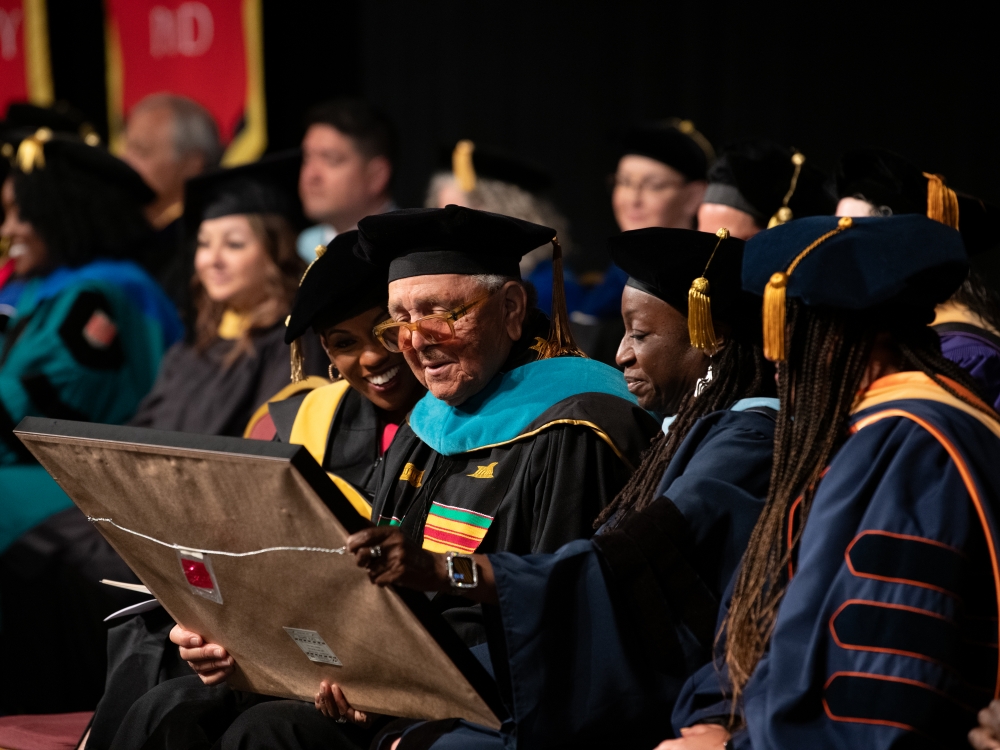May 2025
Progress can be a non-linear, slow climb, and the same can be said for social workers advocating for justice. It takes patience, resilience, hard work, and a few tears along the way.

Tisha Edwards, left, and Wendy Shaia admire the framed UMB Doctor of Public Service honorary degree held by Ronald Chisom.
As civil rights pioneer Ronald Chisom wiped his tears away May 19 standing on the Lyric Baltimore stage in front of over 300 University of Maryland School of Social Work (UMSSW) graduates and their families applauding and cheering, it was clear that his journey is an emotional one.
“I just want to acknowledge the university in amidst of this climate to be willing to bring this acknowledgment to me is unbelievable because the way the universities are being challenged is unbelievable,” said Chisom, who received an honorary Doctor of Public Service degree from the University of Maryland, Baltimore.
Chisom, affectionately known as Brother Ron, is co-founder of the People’s Institute for Survival and Beyond (PISAB), based in New Orleans. His journey began in New Orleans, where he organized tenants in public housing, successfully sued landlords to improve inhumane living conditions, and inspired communities to take collective action.
(See photo gallery below.)
His landmark 1984 case against the Louisiana Supreme Court paved the way for the election of the state’s first Black Supreme Court Justice, securing a legacy through the “Chisom Seat,” which remains a cornerstone of legal history.
His anti-racism training model and the organization’s Undoing Racism Community Organizing inspired the SHARP (Structural oppression, Historical trauma, Analysis of Role, Reciprocity and Mutuality, Power) framework developed by Wendy Shaia, EdD, MSW ’01, clinical professor at UMSSW and executive director of the Center for Restorative Change. The SHARP framework is now integrated into the school’s curriculum, faculty development, and student learning experiences.
As Chisom and other speakers referenced, it takes special people to stand up and fight on behalf of others. The Master of Social Work and PhD graduates at UMSSW will be on the forefront of that battle.
“Higher ed is grappling with financial cuts, job losses, the dismantling of key programs and initiatives, and actions and attitudes reminiscent of the pre-Civil Rights era,” said UMSSW Dean Judy L. Postmus, PhD, ACSW. “However, it is during moments of uncertainty and injustice that social workers emerge. Social workers are needed now more than ever.”
Postmus implored the 63rd graduating class of UMSSW to adapt, not to be afraid of making mistakes, and take time for themselves while fighting for others.
“I cannot emphasize this enough: practice self-care, practice self-care, practice self-care,” Postmus said.
Not all change will feel good, as keynote speaker and UMSSW 2025 Alumni of the Year Tisha S. Edwards, JD ’01, MSW ’00, shared her family’s struggles and successes. The former state cabinet secretary who is now the Maryland Bankers Association’s president and CEO encouraged graduates to have the power to spark change and be patient for it to take shape.
“As the kids say: Life be ‘lifing,’ which translates to the longer you live, the more ups-and-downs you will experience,” Edwards said. “We must learn to embrace and manage change because it’s the precursor to all that is good and well in the world.
“Class of 2025: You were not called to this work by accident. You were chosen — by purpose, by passion, and for people.”
Within that passion for people, student speaker Lia Paolucci called on her fellow graduates to foster connections to strengthen communities and stand up against oppression.
Paolucci has done that not only through her pursuit of a career in health care but also as an aviation officer in the Maryland Army National Guard, where she serves as a detachment commander and UH-60 Black Hawk helicopter pilot. Paolucci is concurrently enrolled in a respiratory care program at Saint Joseph’s University, complementing her MSW degree with a clinical concentration from UMSSW.
“As social workers, we are taught to meet people where they are,” Paolucci said. “And now it is up to us to meet the world, where it is, which is in desperate need of both and compassionate action.”
Search UMB News
Sign up for UMB Alerts.



